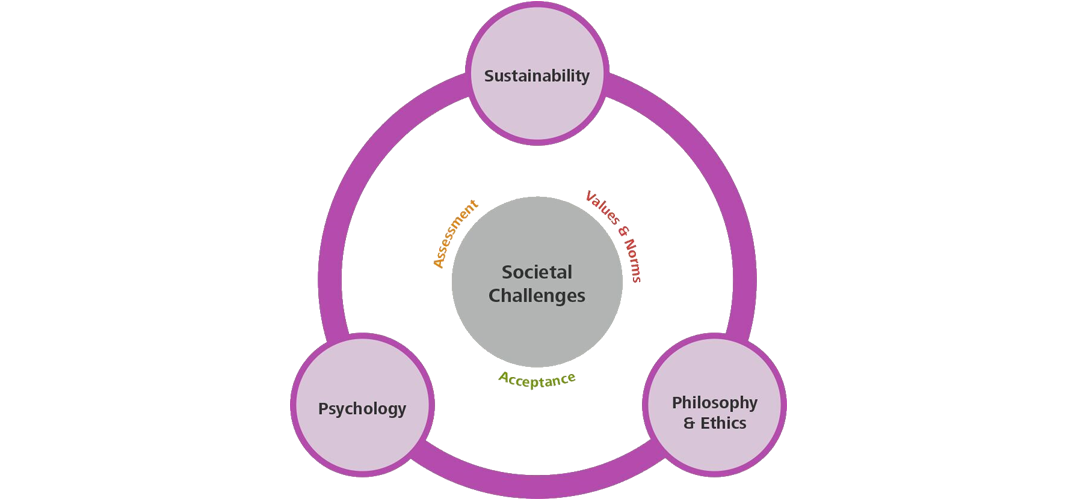Forschungsbereich D

Gesellschaftliche Herausforderungen und Nachhaltigkeit
Die Aspekte Nachhaltigkeit, psychologische Akzeptanz und ethische Zustimmung prägen direkt die Forschungsarbeit in livMatS. So wird die Nachhaltigkeit der angewandten Methoden und neuen Entwicklungen konstant evaluiert und hinterfragt. Gleichzeitig spielen Fragestellungen der gesellschaftlichen Akzeptanz und die philosophische Auseinandersetzung mit traditionellen Vorstellungen von dem, was als „natürlich”, „künstlich”, „lebendig” oder „unbelebt” gilt, eine wichtige Rolle für die öffentliche Wahrnehmung. Denn lebende Materialsysteme sind im wissenschaftlichen wie auch im gesellschaftlichen Kontext mit bestimmten Haltungen und Vorurteilen behaftet.
Die Entwicklung lebender Materialsysteme wird Teil eines verantwortungsvollen wissenschaftlichen und technischen Fortschritts im Anthropozän sein – dem erdgeschichtlichen Zeitalter, in dem wir aktuell leben, und in dem menschgemachte Einflüsse auf die belebte und unbelebte Natur dominieren. Anstatt zuerst die technologische Entwicklung abzuschließen und dann die Auswirkungen auf die Gesellschaft zu analysieren, verbindet livMatS die Technologieentwicklung direkt mit Nachhaltigkeitsbewertungen, Verhaltensanalysen zur Akzeptanz und dem philosophisch-ethischen Diskurs hinsichtlich des Zusammenspiels von menschlicher Kontrolle und Autonomie der Systeme. Dafür arbeiten in livMatS Expert*innen aus Natur- und Ingenieurwissenschaften eng mit Expert*innen aus Nachhaltigkeitsforschung, Psychologie, Philosophie und Ethik zusammen. Ziel ist es, den gesellschaftlichen Anforderungen an zukunftsorientierte Umwelt- und Energietechnologien gerecht zu werden.
Koordinatorin Forschungsbereich D
Prof. Dr. Andrea Kiesel
Projekte in Forschungsbereich D
Langzeitprojekte 2022 und 2023
- Sustainability Systems Assessment of the livMatS materials systems for enabling sustainability transitions towards a resource-efficient and resilient infrastructure
- Trust in bioinspired technologies in light of the ‘normativity of nature’
- "System" as an interdisciplinary concept and the research on living materials systems
- Predicting attitudes and behavior concerning living materials: Assessing the reliability of the CAM method as a measurement tool
- Analyzing the core concept of sustainability: An interdisciplinary approach combining cognitive affective mapping and philosophical reflection
Dieses Projekt ist Teil des Hermann Staudinger Doctoral Fellowship Program des Exzellenzclusters.
Langzeitprojekte 2019 und 2020
- livMatS as part of and reaction to the Anthropocene: Ethical and philosophical implications of living materials systems
- Collection and evaluation of basal attributes of living materials systems
- Predicting attitudes and behavior concerning living materials: Development of software and analysis methods to apply cognitive affective maps
- Development of a TAPAS (Tiered Approach for Prospective Assessment of Benefits and Challenges) and first applications
- Demonstratoren für weiche, autonome Maschinen – softrobotische, energiesparende Greifersysteme mit sensorischen Fähigkeiten auf Basis von livMatS-Materialien
Kooperationsprojekt der Forschungsbereiche B, D und Demonstratoren
Booster-Projekte 2023 - abgeschlossen
- Identification of ethical issues and the influence of multiple core constructs on the acceptability of emerging technologies – a large-scale online survey
Principal Investigator: Prof. Dr. Andrea Kiesel - Intra- and extracellular self-assembly of filamentous protein polymers
Kooperationsprojekt der Forschungsbereiche B, C und D.
Principal Investigator: Prof. Dr. Ralf Reski - Modelling Abscission of Plant Organs as Inspiration for the Separation of Artificial Materials Systems
Kooperationsprojekt der Forschungsbereiche C und D.
Principal investigator: Dr. Olga Speck
Responsible Investigator: Prof. Dr. Patrick Dondl - A sustainable approach towards peptide synthesis in water
Kooperationsprojekt der Forschungsbereiche A, B, D und Demonstratoren.
Junior Research Group leader: Dr. Charalampos Pappas
Principal Investigator: Prof. Dr. Jürgen Rühe - Carbohydrates as predetermined enzymatic breaking points in surface-bound cross-linked polymers
Kooperationsprojekt der Forschungsbereiche B und D.
Principal Investigator: Prof. Dr. Jürgen Rühe
Responsible Investigator: Prof. Dr. Daniel B. Werz - Zinc(Photo)Batt
Kooperationsprojekt der Forschungsbereiche A und D.
Principal Investigator: Prof. Dr. Anna Fischer
Responsible Investigator: Dr. Daniel Biro
Booster-Projekte 2021 - abgeschlossen
- What Drives Ethical Decisions? Ethical Evaluation of Bioinspired Technologies in real time
Principal Investigator: Prof. Dr. Lore Hühn
Responsible Investigator: Prof. Dr. Oliver Müller
Kurzprojekte 2021 - abgeschlossen
- The autonomy of nature. Rethinking the status of nature in livMats and the Anthropocene
Principal Investigator: Prof. Dr. Lore Hühn
Kurzprojekte 2020 - abgeschlossen
- The concept of life in livMatS and the Anthropocene
Principal Investigator: Prof. Dr. Lore Hühn